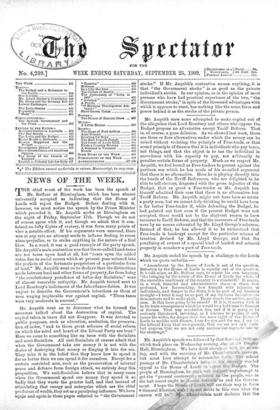Mr. Asquith once more attempted to make capital out of
the allegation that Lord Rosebery and others who oppose the Budget propose no alternative except Tariff Reform. That is, of course, a pure delusion. As we showed last week, there are three or four alternatives under which the money can be raised without violating the principle of Free-trade, or that sound principle of finance that it is individuals who pay taxes, not things, and that the object is to tax the individual in accordance with his capacity to pay, not arbitrarily to penalise certain forms of property. Much as we respect Mr. Asquith, we feel bound as Free-traders to protest against the partisan use which he has made of his so-called argument that there is no alternative. Here he is playing directly into the hands of the Tariff Reformers, who aro delighted to be able to tell electors, disgusted with the gross injustice of the Budget, that so great a Free-trader as Mr. Asquith has himself admitted their case that there is no alternative but Tariff Reform. Mr. Asquith might not have been so astute a party man, but we cannot help thinking he would have been a far better Free-trader if, while defending the Budget, he had pointed out that even if the present Budget were not accepted, there would not be the slightest reason to have recourse to Tariff Reform, and that the resources of Free-trade were by no means exhausted by Mr. Lloyd George's schemes. Instead of that, he has allowed it to be understood that Free-trade is bankrupt except for the particular scheme of taxation devised by Mr. Lloyd George, and that the penalising of owners of a special kind of landed and mineral property is somehow a part of Free-trade.










































